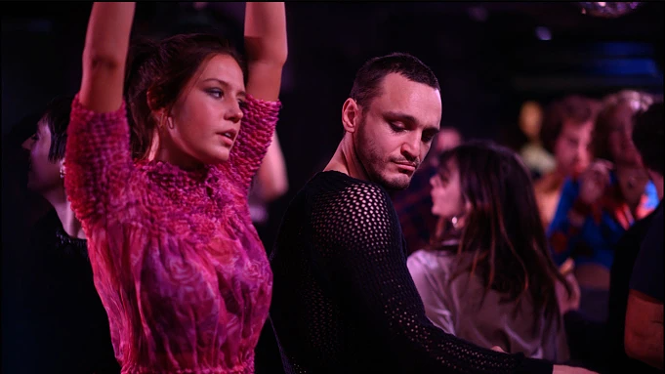Support the Free Press | Facts matter. Truth matters. Journalism matters
Salt Lake City Weekly has been Utah's source of independent news and in-depth journalism since 1984. Donate today to ensure the legacy continues.
Saturday, January 28, 2023
Sundance Film Festival 2023: Day 9 Capsule Reviews
Passages, Squaring the Circle (The Story of Hipgnosis), The Persian Version and more
Posted By Scott Renshaw on January 28, 2023, 9:49 AM
Passages **** [Premieres]
In hindsight, there’s something pitch-perfect about the fact that the movie Tomas (Franz Rogowski), the filmmaker anti-hero of co-writer/director Ira Sachs’ feature, is making at the outset is titled Passages, produced (like this movie) by SBS Productions; if nothing else, it’s a portrait of a kind of solipsism whereby you just assume everything must be all about you. The premise finds Thomas beginning an affair with a woman named Agathe (Adèle Exarchopoulos)—one that he has no problem immediately telling his husband of 15 years, Martin (Ben Whishaw), took place. While this is a sort of romantic triangle that eventually becomes a romantic square, it’s one where Sachs and his regular co-writing partner Mauricio Zacharias make it clear that one side is always out of balance with the others. Their script and Rogowski’s performance magnificently evoke a certain kind of narcissistic artist so convinced that they feel things more deeply than the rest of the world that the feelings of the other people in their lives almost don’t exist. And Sachs’ complements this singular character study with unconventional filmmaking choices, like cutting from an awkward bedtime silence between Tomas and Martin not to pretending everything is normal the next day, but to the middle of the fight that clearly immediately ensued. Passages is stunning in its simplicity, letting Tomas wreck his own life through the fundamental inability to see those he claims to love as anything but supporting characters in a movie where he’s the hero. (SR)
Squaring the Circle (The Story of Hipgnosis) ***1/2 [Spotlight]
The groundbreaking British graphic-design collective Hipgnosis was responsible for some of the most iconic album covers of the late-1960s and 1970s, for artists like Pink Floyd, Led Zeppelin and Peter Gabriel. While you may not think that an entire documentary about how those album covers were created could sustain more than 100 minutes, you’d be wrong. Director Anton Corbijn talks with Hipgnosis co-founder Aubrey “Po” Powell—his co-founder, Storm Thorgerson, died in 2013—and plenty of the artists they worked with, tracking the launch of the company thanks to their friendship with Pink Floyd’s Syd Barrett, and exploring 15-ish years of fascinating art and the bygone era of music-industry excess of which it was a part. The anecdotes about photo shoots and creative decisions behind those album covers are almost universally hilarious and fascinating—the one involving Pink Floyd’s Animals could have been its own short film—while providing insight into the main creative minds behind them. Most perceptively, they speak from enough distance to realize the egotistic absurdity behind creative visions like shooting the cover for Wings’ greatest-hits record on a European mountain-top, when it just as easily could have been shot in a studio. There’s a bit of nostalgia, as well, for a time when—as Oasis’ Noel Gallagher puts it—album covers were a “poor man’s art collection,” while also recognizing that some of these decisions were just plain crazy. Plus, it’s a moment of sheer delight when Paul McCartney is informed that the concept for one of his Hipgnosis-designed album covers was something rejected by other bands. (SR)
The Persian Version ** [U.S. Dramatic]
Sincere, deeply-felt and personal though this story may be, writer/director Maryam Keshavarz turns out something so over-written and fragmented that it just doesn’t come together as a movie. It’s the story of Leila (Layla Mohammadi), the Iranian-American daughter of immigrants, estranged from her mother Shireen (Niousha Noor) less for her artistic aspirations as an aspiring filmmaker than for being queer. After a one-night stand with a man, Leila ends up pregnant, leading to an even more fervent desire to understand her own mother. Keshavarz launches the narrative clearly in the vein of a quirky comedy, full of direct address to the camera, bold on-screen titles for text messages, flashbacks to 1980s dance numbers and absurdist moments like Leila trying to avoid being seen by her ex by putting on a gorilla mask. But eventually a large chunk of the third act is turned over to the experience of Shireen as a teenage wife (Kamand Shafieisabet) in 1960s Iran, with an accompanying shift in tone that’s considerably darker. And that’s following another, previous flashback to Shireen’s single-minded pursuit of becoming a realtor, and preceding an unresolved snippet of maybe-romantic-comedy involving Leila and her baby-daddy (Tom Byrne). As much as this is clearly an artistic attempt to forgive a mother for her conservative, judgmental ways, it’s just a mess as a narrative trying to cover too much ground. It feels like the kind of movie where the creator would justify it by saying “all of this happened,” to which the response might be, “but that doesn’t mean it all belongs in the same movie.” (SR)
Victim/Suspect ***1/2 [U.S. Documentary]
Sometimes you can’t separate how angry a movie makes you feel from whether it’s a great piece of filmmaking—and maybe, in some cases, that’s okay. The fury that emerges is profound as director Nancy Schwartzman follows the work of Rae de Leon, a reporter for California-based Center for Investigative Reporting, as she digs into nationwide examples of women who have reported sexual assault to police being accused of—and arrested for—making false statements. Schwartzman and de Leon are meticulous in chronicling the police behavior responsible for these “flipped” cases, as they make use of video interviews that show investigators lying to these women about evidence proving that they’re liars, while further exposing how this is kind of just standard practice in order to make a case go away. They also wisely focus on a few individual cases, and the victims whose lives were devastated not once but twice, letting them tell their stories and confront the reality of how they were manipulated. It’s a debatable choice to make de Leon the hero of the story, giving as much focus to the process of exposing these actions as to the actions themselves. Then again, maybe it’s important to emphasize that the investigative legwork done by journalists on this subject should have been done by law enforcement, to emphasize that it’s not that they couldn’t have made this same effort, but they were simply too lazy and callous to do it. (SR)
Talk to Me **1/2 [Midnight]
Creating a clear, understandable set of “rules” may not be the most important thing when you’re creating a supernatural horror story, but you can certainly feel the loss of impact when those rules aren’t clear. The Australian filmmaking team of brothers Danny and Michael Philippou introduce us to Mia (Sophie Wilde), one of a group of teenage friends who become fascinated with an embalmed hand that appears to have the ability to invite the spirits of dead souls into a host—with, not surprisingly, potentially terrible consequences. The early scenes are perhaps the most effective, emphasizing the flippancy with which these kids treat their occult dabblings, right up until the point where things go dreadfully wrong. It’s also clear that the Philippous want to connect their premise with—say it all together with me now, horror fans—trauma, more specifically Mia’s ongoing grief over the loss of her mother, possibly to suicide. The problem with Talk to Me as the creepy scenes unfold is that rather than revealing more about the nature of these possessions, the film actually gets murkier about them. What exactly are these spirits trying to accomplish? Are they deliberately deceiving Mia in the messages they deliver to her, and if so, to what end? There are some fun, unsettling scares throughout the running time, but the notion that it’s heading towards some particular payoff from a character standpoint remains much harder to grab on to than that embalmed hand. (SR)
In hindsight, there’s something pitch-perfect about the fact that the movie Tomas (Franz Rogowski), the filmmaker anti-hero of co-writer/director Ira Sachs’ feature, is making at the outset is titled Passages, produced (like this movie) by SBS Productions; if nothing else, it’s a portrait of a kind of solipsism whereby you just assume everything must be all about you. The premise finds Thomas beginning an affair with a woman named Agathe (Adèle Exarchopoulos)—one that he has no problem immediately telling his husband of 15 years, Martin (Ben Whishaw), took place. While this is a sort of romantic triangle that eventually becomes a romantic square, it’s one where Sachs and his regular co-writing partner Mauricio Zacharias make it clear that one side is always out of balance with the others. Their script and Rogowski’s performance magnificently evoke a certain kind of narcissistic artist so convinced that they feel things more deeply than the rest of the world that the feelings of the other people in their lives almost don’t exist. And Sachs’ complements this singular character study with unconventional filmmaking choices, like cutting from an awkward bedtime silence between Tomas and Martin not to pretending everything is normal the next day, but to the middle of the fight that clearly immediately ensued. Passages is stunning in its simplicity, letting Tomas wreck his own life through the fundamental inability to see those he claims to love as anything but supporting characters in a movie where he’s the hero. (SR)
Squaring the Circle (The Story of Hipgnosis) ***1/2 [Spotlight]
The groundbreaking British graphic-design collective Hipgnosis was responsible for some of the most iconic album covers of the late-1960s and 1970s, for artists like Pink Floyd, Led Zeppelin and Peter Gabriel. While you may not think that an entire documentary about how those album covers were created could sustain more than 100 minutes, you’d be wrong. Director Anton Corbijn talks with Hipgnosis co-founder Aubrey “Po” Powell—his co-founder, Storm Thorgerson, died in 2013—and plenty of the artists they worked with, tracking the launch of the company thanks to their friendship with Pink Floyd’s Syd Barrett, and exploring 15-ish years of fascinating art and the bygone era of music-industry excess of which it was a part. The anecdotes about photo shoots and creative decisions behind those album covers are almost universally hilarious and fascinating—the one involving Pink Floyd’s Animals could have been its own short film—while providing insight into the main creative minds behind them. Most perceptively, they speak from enough distance to realize the egotistic absurdity behind creative visions like shooting the cover for Wings’ greatest-hits record on a European mountain-top, when it just as easily could have been shot in a studio. There’s a bit of nostalgia, as well, for a time when—as Oasis’ Noel Gallagher puts it—album covers were a “poor man’s art collection,” while also recognizing that some of these decisions were just plain crazy. Plus, it’s a moment of sheer delight when Paul McCartney is informed that the concept for one of his Hipgnosis-designed album covers was something rejected by other bands. (SR)
The Persian Version ** [U.S. Dramatic]
Sincere, deeply-felt and personal though this story may be, writer/director Maryam Keshavarz turns out something so over-written and fragmented that it just doesn’t come together as a movie. It’s the story of Leila (Layla Mohammadi), the Iranian-American daughter of immigrants, estranged from her mother Shireen (Niousha Noor) less for her artistic aspirations as an aspiring filmmaker than for being queer. After a one-night stand with a man, Leila ends up pregnant, leading to an even more fervent desire to understand her own mother. Keshavarz launches the narrative clearly in the vein of a quirky comedy, full of direct address to the camera, bold on-screen titles for text messages, flashbacks to 1980s dance numbers and absurdist moments like Leila trying to avoid being seen by her ex by putting on a gorilla mask. But eventually a large chunk of the third act is turned over to the experience of Shireen as a teenage wife (Kamand Shafieisabet) in 1960s Iran, with an accompanying shift in tone that’s considerably darker. And that’s following another, previous flashback to Shireen’s single-minded pursuit of becoming a realtor, and preceding an unresolved snippet of maybe-romantic-comedy involving Leila and her baby-daddy (Tom Byrne). As much as this is clearly an artistic attempt to forgive a mother for her conservative, judgmental ways, it’s just a mess as a narrative trying to cover too much ground. It feels like the kind of movie where the creator would justify it by saying “all of this happened,” to which the response might be, “but that doesn’t mean it all belongs in the same movie.” (SR)
Victim/Suspect ***1/2 [U.S. Documentary]
Sometimes you can’t separate how angry a movie makes you feel from whether it’s a great piece of filmmaking—and maybe, in some cases, that’s okay. The fury that emerges is profound as director Nancy Schwartzman follows the work of Rae de Leon, a reporter for California-based Center for Investigative Reporting, as she digs into nationwide examples of women who have reported sexual assault to police being accused of—and arrested for—making false statements. Schwartzman and de Leon are meticulous in chronicling the police behavior responsible for these “flipped” cases, as they make use of video interviews that show investigators lying to these women about evidence proving that they’re liars, while further exposing how this is kind of just standard practice in order to make a case go away. They also wisely focus on a few individual cases, and the victims whose lives were devastated not once but twice, letting them tell their stories and confront the reality of how they were manipulated. It’s a debatable choice to make de Leon the hero of the story, giving as much focus to the process of exposing these actions as to the actions themselves. Then again, maybe it’s important to emphasize that the investigative legwork done by journalists on this subject should have been done by law enforcement, to emphasize that it’s not that they couldn’t have made this same effort, but they were simply too lazy and callous to do it. (SR)
Talk to Me **1/2 [Midnight]
Creating a clear, understandable set of “rules” may not be the most important thing when you’re creating a supernatural horror story, but you can certainly feel the loss of impact when those rules aren’t clear. The Australian filmmaking team of brothers Danny and Michael Philippou introduce us to Mia (Sophie Wilde), one of a group of teenage friends who become fascinated with an embalmed hand that appears to have the ability to invite the spirits of dead souls into a host—with, not surprisingly, potentially terrible consequences. The early scenes are perhaps the most effective, emphasizing the flippancy with which these kids treat their occult dabblings, right up until the point where things go dreadfully wrong. It’s also clear that the Philippous want to connect their premise with—say it all together with me now, horror fans—trauma, more specifically Mia’s ongoing grief over the loss of her mother, possibly to suicide. The problem with Talk to Me as the creepy scenes unfold is that rather than revealing more about the nature of these possessions, the film actually gets murkier about them. What exactly are these spirits trying to accomplish? Are they deliberately deceiving Mia in the messages they deliver to her, and if so, to what end? There are some fun, unsettling scares throughout the running time, but the notion that it’s heading towards some particular payoff from a character standpoint remains much harder to grab on to than that embalmed hand. (SR)
More by Scott Renshaw
-
Film Reviews: New Releases for April 19
The Ministry of Ungentlemanly Warfare, Abigail, The Beast, Hard Miles, Sasquatch Sunset and more
- Apr 19, 2024
-
Faces of Salt Lake County book and portrait reception
Images and personal stories in a new book reveal local demographic diversity
- Apr 17, 2024
-
Feature film review: THE BEAST
A filmmaker's compelling ideas get a bit tangled in references to his creative influences.
- Apr 17, 2024
- More »









